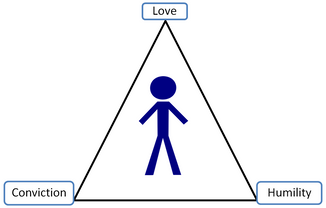-
About
Our Story
back- Our Mission
- Our Leadership
- Accessibility
- Careers
- Diversity, Equity, Inclusion
- Learning Science
- Sustainability
Our Solutions
back
-
Community
Community
back- Newsroom
- Discussions
- Webinars on Demand
- Digital Community
- The Institute at Macmillan Learning
- English Community
- Psychology Community
- History Community
- Communication Community
- College Success Community
- Economics Community
- Institutional Solutions Community
- Nutrition Community
- Lab Solutions Community
- STEM Community
- Newsroom
- Macmillan Community
- :
- Psychology Community
- :
- Talk Psych Blog
- :
- Aspiring to a Life—and a Culture—Encircled by Conv...
Aspiring to a Life—and a Culture—Encircled by Conviction, Humility, and Love
- Subscribe to RSS Feed
- Mark as New
- Mark as Read
- Bookmark
- Subscribe
- Printer Friendly Page
- Report Inappropriate Content
Hate-fueled pipe bombs target Democrats. Two African Americans are gunned down in a grocery story. An anti-Semite slaughters synagogue worshippers. Political leaders denigrate and despise their opponents. In National Election Studies surveys, the percentage of Republicans and Democrats who “hate” the other party has soared, for both sides—from 20 percent in 2000, to near 50 percent in 2016. (Let’s make it personal: Would you want your child to marry a devotee of the other party?)
Hostilities are poisoning the culture, and many Americans are wondering: How can we, as individuals and as a culture, turn a corner? Amid animosities fed by groundless fears, fact-free ignorance, and repeated (then believed) big lies, how can we embrace our common humanity and shared goals?
As we social psychologists remind folks, conflicts lessen through contact, cooperation, and communication. Personal contact with equal-status others helps (it’s not just what you know, but who you know). Cooperative striving for shared superordinate goals—those that require the cooperation of two or more people—fosters unity (it even helps to have a common enemy). Ditto guided communication (an aim of www.BraverAngels.org, which brings together “Reds” and “Blues” to understand each other’s concerns and to discover their overlapping aspirations).
And might we, individually and as a culture, also benefit by teaching and modeling an outlook that encompasses three virtues: conviction, humility, and love?
Our convictions define what matters. We anchor our lives in core beliefs and values that guide our lives. Our convictions motivate our advocacy for a better world. They give us courage to speak and act. “We must always take sides,” said Holocaust survivor Elie Weisel. “Silence encourages the tormentor, never the tormented.” “To be silent is to be complicit,” adds Dead Man Walking author Sister Helen Prejean.
But convictions need restraining with humility, a virtue that lies at the heart of science for theists and nontheists alike. Those of us who are theists, of whatever faith tradition, share two convictions:
- There is a God.
- It’s not me (or you).
Ergo, we are fallible. The surest conviction we can have is that some of our beliefs err. From this follows the religious virtue of humility (alas, a virtue more often preached than practiced). A spirit of humility seasons conviction with open-minded curiosity. It tempers faith with uncertainty (faith without humility is fanaticism). It subjects our opinions to evidence and enables good science. It tells me that every person I meet is, in some way, my superior . . . providing an opportunity to learn.
The triangle of virtues within which we can aspire to live is completed when conviction, restrained by humility, is directed by love. In his great sermon on love, Martin Luther King, Jr. quoted Jesus: “Love your enemies, bless them that curse you, do good to them that hate you.” Doing that, he said, does not compel us to like our enemies, but does compel us “to discover the element of good” in them. By contrast, “hate only intensifies the existence of hate and evil in the universe,” he added. “If I hit you and you hit me and I hit you back and you hit me back and go on, you see, that goes on ad infinitum. It just never ends. . . . Hate destroys the hater as well as the hated.”
Is this not a vision of a good life that will enable a flourishing culture . . . a life that is animated by deep convictions, which are refined in humility and applied with love?
(For David Myers’ other essays on psychological science and everyday life visit TalkPsych.com)
You must be a registered user to add a comment. If you've already registered, sign in. Otherwise, register and sign in.
-
Abnormal Psychology
6 -
Achievement
1 -
Affiliation
1 -
Cognition
8 -
Consciousness
7 -
Current Events
22 -
Development Psychology
10 -
Developmental Psychology
9 -
Emotion
10 -
Gender
1 -
Gender and Sexuality
1 -
Genetics
2 -
History and System of Psychology
2 -
Industrial and Organizational Psychology
2 -
Intelligence
3 -
Learning
3 -
Memory
2 -
Motivation
3 -
Motivation: Hunger
1 -
Nature-Nurture
4 -
Neuroscience
6 -
Personality
9 -
Psychological Disorders and Their Treatment
8 -
Research Methods and Statistics
22 -
Sensation and Perception
8 -
Social Psychology
70 -
Stress and Health
8 -
Teaching and Learning Best Practices
7 -
Thinking and Language
11 -
Virtual Learning
2







